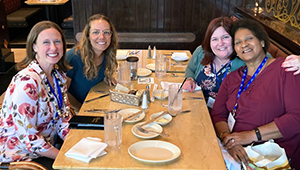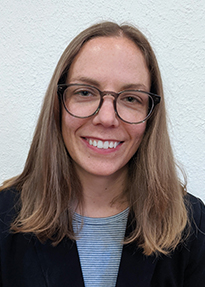Jess Mogk, MPH
Biography
Jess Mogk uses implementation practice to bridge the gap between research and care. Current evidence is always expanding and evolving, and Jess partners with care teams to help them update workflows and practices to align with the best approaches identified by research. Jess is an expert in change strategies including practice facilitation, learning collaboratives, and quality improvement methods.
Jess joined Kaiser Permanente Washington Health Research Institute (KPWHRI) as a research specialist in 2015. After graduating with a Master of Public Health from the University of Washington Community-Oriented Public Health Practice Program in 2018, she started working as an implementation and evaluation associate. She formally joined the KPWHRI faculty as a collaborative scientist in 2022.
In addition to her work with clinical teams, Jess also has a background in qualitative research and anthropology, which she applies to many KPWHRI studies. Her work has covered a wide variety of research topics, including medical decision-making for patients with cancer, qualitative evaluation of the community resource specialist role in Kaiser Permanente Washington, clinician experiences implementing an app-based treatment for substance use disorder, and patient experiences 5 years after bariatric surgery.
An example of a recent project is her work on the Integrated Pain Management Program with KPWHRI’s Center for Accelerating Care Transformation (ACT Center). As part of this project, Jess founded a patient partner group to help guide the program and center it on patient experiences. A blog by Jess’s colleague Sarah Brush provides insights about their collaboration with patient partners.
Areas of research focus
-
Clinical Quality Improvement
Practice facilitation, implementation science
-
Patient-Centered Outcomes Research
Patient engagement and partnership
-
Medication Use & Patient Safety
Primary care quality, implementation science
-
Social Determinants of Health
Addressing social needs in primary care, housing, and homelessness
-
Addictions
Digital therapeutics for substance use disorder treatment
Recent Publications
Lewis CC, Pullmann MD, Hsu C, Norris C, Mogk J, Pardee R, Walsh-Bailey C, Westbrook E, Lee A, Ridpath J, DeWitt C, Mahmud A, Coleman K, Lozano P Optimizing the community resource specialist to address social needs in primary care: results from a pragmatic quality improvement evaluation 2025 Oct 31;26(1):330. doi: 10.1186/s12875-025-02922-x. Epub 2025-10-31. PubMed
Hansell LD, Hsu CW, Mogk JM, Paz SR, Moore DD, Macias MM, Bhakta BB, Crawford CL, Ellis D, Lopez C, Jackson T, Graves R, Corralejo V, Gray MF, Young DR, Drewnowski A, Lewis KH, Murali SB, Coleman KJ Experiences and Perspectives of Racially Diverse Patients 5 Years Post-Bariatric Surgery: Qualitative Findings from the BELONG II Study 2025 Oct 16 doi: 10.1007/s40615-025-02635-y. Epub 2025-10-16. PubMed
Jones SMW, Aoki RF, Alexeeff SE, Carrell D, Cronkite D, Kushi LH, Mosen D, Strayhorn S, Tuzzio L, Mogk J, Mammini L, Kroenke CH Evaluation of the Electronic Health Record-Support Social Support Score in Breast Cancer: Comparison of Count and Item Response Theory Scores 2025 Oct 6 doi: 10.1177/19427891251383539. Epub 2025-10-06. PubMed
Lozano PM, Allen CL, Barnes KA, Peck M, Mogk JM Persistent pain, long-term opioids, and restoring trust in the patient-clinician relationship 2025 Feb;27:104694. doi: 10.1016/j.jpain.2024.104694. Epub 2024-10-07. PubMed
Mogk J, Allen CL, Levitz CE, Stefanik-Guizlo K, Bourcier E, Trapp Petty M, Lozano P Virtual practice facilitation as an implementation strategy for launching opioid safety committees for quality improvement in primary care: feasibility, acceptability, and intervention fidelity 2024 Oct 26;25(1):384. doi: 10.1186/s12875-024-02632-w. Epub 2024-10-26. PubMed
Blog

Improving pain care by restoring trust
New paper explores how health systems can improve opioid prescribing safety with patient-centered care
Healthy findings blog

Accelerating qualitative research with Rap-GAP
Clarissa Hsu and Jess Mogk share a new way to fast-track insights from qualitative data.
Healthy findings blog

Patient partners: A missing ingredient at conferences?
Starette Canada, a patient partner, shares her experience at a recent conference and highlights gaps in patient engagement.



